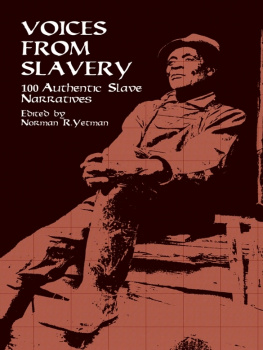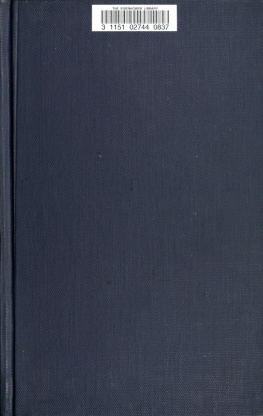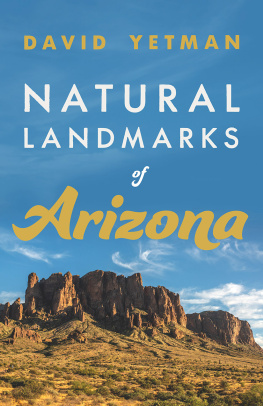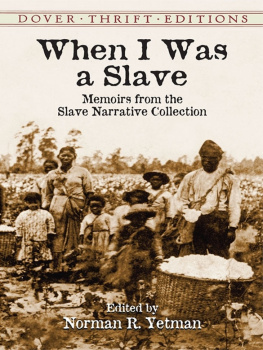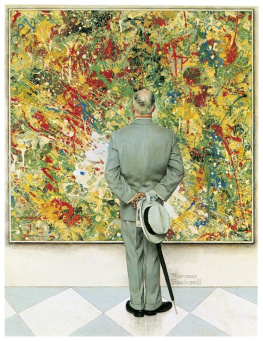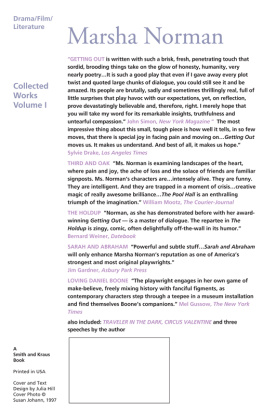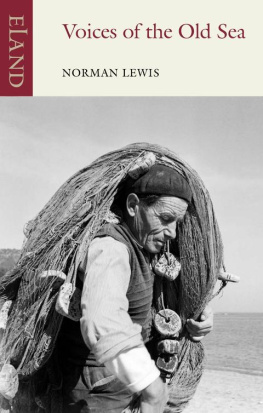Acknowledgment
Norman R. Yetman. Ex-Slave Interviews and the Historiography of Slavery. Americans Quarterly. Vol. 36: 2 (Summer 1984), pp. 181210. 1984. The American Studies Association. Reprinted by permission of the Johns Hopkins University Press.
Copyright
Copyright 1970, 2000 by Norman R. Yetman
All rights reserved.
Bibliographical Note
This Dover edition, first published in 2000, is an enlarged republication of the book first published in 1972 by Holt, Rinehart and Winston, Inc., New York, under the title Voices from Slavery , which was, in turn, the hardcover reprint of the paperbound text edition of the book originally published in 1970 by Holt, Rinehart and Winston, Inc., New York, under the title Life Under the Peculiar Institution: Selections from the Slave Narrative Collection.
The current volume contains an additional chapter at the end of the book, Ex-Slave Interviews and the Historiography of Slavery, originally published in 1984 in American Quarterly , as well as a new Preface by Professor Yetman.
Library of Congress Cataloging-in-Publication Data
Voices from slavery: 100 authentic slave narratives / edited by Norman R. Yetman. p. cm.
Originally published: New York : Holt, Rinehart and Winston, c1970. With new pref.
Contains additional chapter, Ex-slave interviews and the historiography of slavery, originally published in 1984 in American quarterly.
9780486131016
1. SlavesUnited StatesBiography. 2. Afro-AmericansInterviews. I. Yetman, Norman R., 1938
E444 Y43 2000
973.049600922dc21
[B]
99-052280
Manufactured in the United States by Courier Corporation
40912007
www.doverpublications.com
ACKNOWLEDGMENTS
I am grateful to W. Austin Bishop, Joel O. Conarroe, Robert A. Jones, Geoffrey H. Steere, and my wife, Anne, for their assistance both evaluative and supportiveat various stages of this books preparation. I am especially indebted to Benjamin A. Botkin, who graciously permitted me to examine his extensive personal files, whose conversations and correspondence with me were invaluable to my becoming familiar with the Collection, and whose many other kindnesses will always be warmly remembered.
N. R. Y.
PREFACE TO THE DOVER EDITION
N early three decades have elapsed since the publication of the first edition of Voices from Slavery . As I indicated in the introduction to that volume, I had become acquainted with the Slave Narrative Collection while conducting research on my doctoral dissertation at the University of Pennsylvania during the mid-1960s, and in the process of reviewing the literature on slavery that had been published subsequent to the late 1930s Federal Writers Project effort to interview former slaves, I was struck by how infrequently historians and social scientists had utilized what appeared to me to be a unique, invaluable, and indeed, essential source of data for understanding the dynamics of antebellum slavery and the caste system that undergirded and transcended it.
So far as I could determine, the collection was unique in providing an opportunity for such a substantial number (over 2,000) of mostly illiterate people to relate in their own words how the institutional arrangements of slavery and caste had affected them, and how they had responded to the political, economic, and social constraints that it placed upon them. I was convinced that limitations of these personal recollections as historical data were far outweighed by the opportunity they provided to understand the dynamics of slavery from the perspective of the slaves themselves. My objective, therefore, was to publicize and make more widely available this unique body of historical data.
Voices from Slavery and Life Under the Peculiar Institution remained in print for about three years, and then fell victim to the commercial realities that increasingly have come to define what we shall read; I first became aware that the book had been remaindered when, in 1973, I came across a stack of them selling for one dollar apiece in the Johns Hopkins University bookstore in Baltimore. In 1976, Robert W. Krieger published a reprint edition of the book, but it also subsequently went out of print. Nevertheless, for the past twenty years I have continued to have a steady stream of inquiries from people who wished to obtain a copy of the book, so I responded with great interest to the opportunity presented by Dover Publications to make this new reprint edition available.
This is essentially the same book that was published in 1970. The primary change consists in the addition of an essay, Ex-Slave Interviews and the Historiography of Slavery, that was originally published in the American Quarterly in 1984. In my introduction to Voices from Slavery, I argued that as new questions [about slavery] are raised, these highly personal and subjective accounts assume a new significance and become an appropriate, even essential, source of data. In this article I reviewed the dramatic renaissance of interest in American slavery among both historians and social scientists that had occurred during the previous two decades, and I tried to demonstrate that the Slave Narrative Collection interviews had been integral to this reassessment of the peculiar institution.
Although subsequent scholarly attention to American slavery has not been so intense as during the 1960s and 1970s, the topic has continued to engage historians and social scientists who have both built upon and extendedmethodologically and conceptuallythe wealth of scholarship on slavery that appeared during the black protest era.
Norman R. Yetman
University of Kansas
1999
INTRODUCTION
I N 1855 JOHN LITTLE, a fugitive slave who had escaped to Canada, uttered this perceptive commentary upon attempts to convey the realities of the existence that he had fled: Tisnt he who has stood and looked on, that can tell you what slavery istis he who has endured. The view that slavery could be best described by those who had themselves experienced it has found expression in a voluminous numberover 6,000of commentaries, autobiographies, narratives, and interviews with those who had endured. Although most of these accounts appeared prior to the Civil War, about one-third of them are the result of the ambitious efforts of the Federal Writers Project of the Works Progress Administration to interview surviving ex-slaves during the 1930s. The result of the efforts of the Federal Writers was the Slave Narrative Collection, a group of autobiographical accounts of former slaves that today stands as one of the most enduring and unheralded achievements of the Writers Project. Compiled in seventeen states during the years 193638, the Collection consists of over 2,000 interviews with ex-slaves. The interviews, almost exclusively verbatim testimonies concerning antebellum slave life and the respondents personal reactions to bondage, afforded aged ex-slaves an unparalleled opportunity to give their personal account of life under the peculiar institution, to describe in their own words what it felt like to be a slave. The Collection constitutes an illuminating source of data about ante-bellum Southern life, about the institution of slavery, and, most importantly, about the reactions and perspectives of those who had been enslaved.




